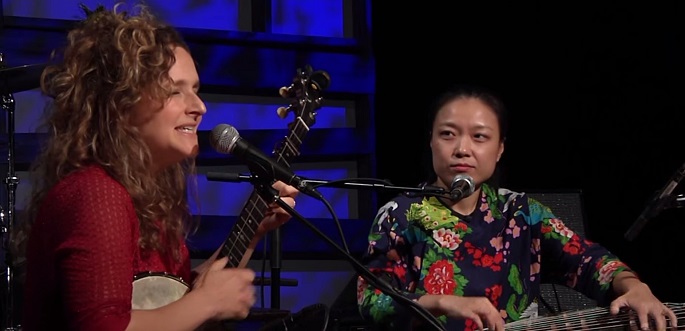For more than an hour, guzheng (Chinese zither) player Wu Fei and American banjo player Abigail Washburn will offer a unique musical experience as they blend traditional Chinese and Appalachian music--"Appalachina"--at Symphony Space in New York on Oct. 17, 7:30 p.m., according to the performing arts center’s website.
This will not be first time that Beijing-born Wu, who describes herself as a “gender-bending composer, guzheng virtuoso and vocalist” on her website, and Washburn, who uses clawhammer picking to play the banjo, will share the same stage together.
They first met and performed together in Colorado in 2006, reported Sinosphere.
“Fei and I hit it off as friends right away,” said Washburn. Wu calls her by her nickname, “Abby.”
Washburn described Wu’s playing as “so bad-ass.”
“She is able to play traditional material with technical wizardry and feel but also capable of improvisation,” said Washburn.
Earlier this year, the two mothers performed at the 2016 Association for Asian Studies Annual Conference (March 31-April 3) in Seattle, Washington.
After witnessing their live show at the said conference, Michigan-based American writer-historian Maura Elizabeth Cunningham, Ph.D., wrote on her blog: “Their performance was incredible--and one of the factors that elevated this year’s AAS above others I’ve attended.”
At one point in their performance at Middlebury College in Vermont July 19, 2015, they--Wu in a flowing pure white dress with her straight hair pulled back into a tight bun and Washburn in a plain black gown with her curly locks hanging freely--sang two different songs at the same time.
While her fingers worked on the 21-string guzheng, Wu belted out, “Wu Su Li Chuan Ge” (“The Boat Song of Wusuli River”), an adaptation of a folk song of the Hezhen ethnic group from North China and originally sung by prominent Shenyang-born tenor Guo Song (1931-2016).
Washburn, on the other hand, simultaneously gave her interpretation of the folk song, “The Water Is Wide.”
The Vanderbilt University in Nashville, Tennessee, honored Washburn by naming her as the university’s first Fellow for its US-China Center, according to the school’s website.
“The US-China Center fellowship program has been created to honor individuals who have made significant contribution to deepening mutual understanding of American and Chinese cultures.”
Washburn developed “a deep love for Chinese culture as well as a strong proficiency in Mandarin” when she lived in China in the ‘90s. Her experience made her become “determined” to share American South’s traditional music to China.
According to her official website, Washburn’s “efforts to share US music in China and Chinese music in the US exist within a hope that cultural understanding and the communal experience of beauty and sound rooted in tradition will lead the way to a richer existence.”
To say that Washburn is active in the music scene could be an understatement.
She performs as a soloist, as a duo--with no less than her Grammy-winning musician-songwriter American husband Bela Fleck--and as a part of two old-time music groups: the all-women Uncle Earl and The Sparrow Quartet, where Fleck is also a member.
And, yes, there is still room for one more group.
She and Wu perform together with Kai Welch, a Grammy-nominated songwriter and musician described by Fleck, according to Welch’s website, as “a powerful musical force.”
They, all residing in Nashville, collectively refer to their act as Wu-Force, a “Kungfu-Appalachian-Indie-Folk-Rock trio,” according to the group’s website.
If there is one thing that is catchier and more interesting than their band’s description, it will be perhaps the music they jointly create.



























